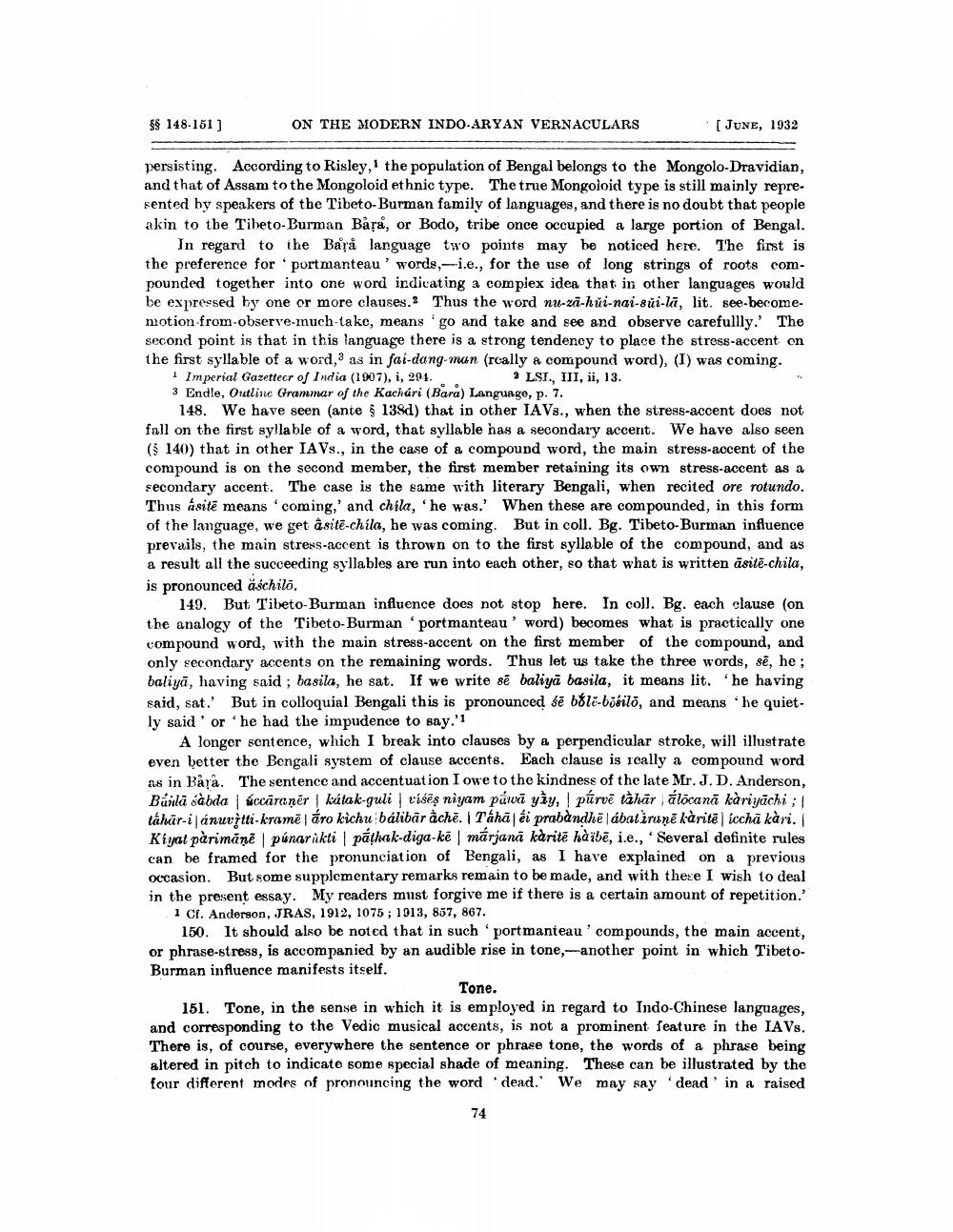________________
$& 148-151 )
ON THE MODERN INDO-ARYAN VERNACULARS
[JUNE, 1932
persisting. According to Risley, the population of Bengal belongs to the Mongolo-Dravidian, and that of Assam to the Mongoloid ethnic type. The true Mongoloid type is still mainly represented by speakers of the Tibeto-Burman family of languages, and there is no doubt that people akin to the Tibeto-Burman Båra, or Bodo, tribe once occupied a large portion of Bengal.
In regard to the Barå language two points may be noticed here. The first is the preference for portmanteau' words,-i.e., for the use of long strings of roots compounded together into one word indicating a complex idea that in other languages would be expressed by one or more clauses. Thus the word nu-za-hui-nai-sui-là, lit. see-become. motion from observe-much-take, means 'go and take and see and observe carefullly. The second point is that in this language there is a strong tendency to place the stress-accent on the first syllable of a word, as in fai-dang-man (really a compound word), (I) was coming. + Imperial Gazetteer of India (1907), i, 294.
3 LSI., III, ii, 13. 3 Endle, Outline Grammar of the Kachári (Bara) Language, p. 7.
148. We have seen (ante § 138d) that in other IAVs., when the stress-accent does not fall on the first syllable of a word, that syllable has a secondary accent. We have also seen (140) that in other IA Vs., in the case of a compound word, the main stress-accent of the compound is on the second member, the first member retaining its own stress-accent as a secondary accent. The case is the same with literary Bengali, when recited ore rotundo. Thus ásitē means 'coming,' and chila, he was. When these are compounded, in this form of the language, we get a site-chila, he was coming. But in coll. Bg. Tibeto-Burman influence prevails, the main stress-accent is thrown on to the first syllable of the compound, and as a result all the succeeding syllables are run into each other, so that what is written āsite-chila, is pronounced aschilo.
149. But Tibeto-Burman influence does not stop here. In coll. Bg. each clause (on the analogy of the Tibeto-Burman 'portmanteau' word) becomes what is practically one compound word, with the main stress-accent on the first member of the compound, and only secondary accents on the remaining words. Thus let us take the three words, së, he: baliya, having said ; basila, he sat. If we write sē baliya basila, it means lit. he having said, sat.' But in colloquial Bengali this is pronounced se b817-bõšilo, and means he quietly said ' or he had the impudence to say.'1
A longer sentence, which I break into clauses by a perpendicular stroke, will illustrate even better the Bengali system of clause accents. Each clause is really a compound word as in Båå. The sentence and accentuation I owe to the kindness of the late Mr. J. D. Anderson, Búrla sàbda üccaraner kátak-guli višēs niyam páwa yiy, I púrvē tàhär á lócana kàriyāchi; táhār-i anurğtti-kramē aro kichu bálibar ache. Táha ei prabandhë lábat irunē kàritē) icchā kàri. Kívat primänë púnarikti pathak-diga-kē márjana kàritë hàibē, i.e., Several definite rules can be framed for the pronunciation of Bengali, as I have explained on a previous occasion. But some supplementary remarks remain to be made, and with theke I wish to deal in the present essay. My readers must forgive me if there is a certain amount of repetition.'
1 Cf. Anderson, JRAS, 1912, 1075; 1913, 857, 867.
150. It should also be noted that in such portmanteau' compounds, the main accent, or phrase-stress, is accompanied by an audible rise in tone,-another point in which TibetoBurman influence manifests itself.
Tone. 151. Tone, in the sense in which it is employed in regard to Indo-Chinese languages, and corresponding to the Vedic musical accents, is not a prominent feature in the IAVs. There is, of course, everywhere the sentence or phrase tone, the words of a phrase being altered in pitch to indicato some special shade of meaning. These can be illustrated by the four different modes of pronouncing the word 'dead.' We may say 'dead' in a raised
74




